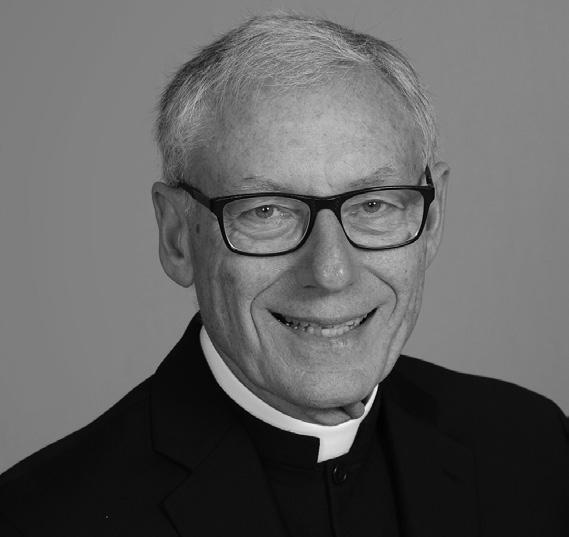
22 minute read
p.m. at the Diocesan Pastoral Center and conclude at the Cathedral of the Holy Trinity in New Ulm. The procession will
En Tierra Buena
por Monseñor Douglas Grams Administrador Diocesano
Advertisement
Me acuerdo la historia en el libro de Génesis cuando Dios creó el huerto del Edén y lo confió a Adán para que lo cultivara y lo cuidara. Su trabajo fue de cuidar la creación de Dios. Adán cuidaba del jardin y recibia los regalos de Dios con gratitud, cultivandolo responsablemente. En mi caso, como Administrador Diocesano durante los últimos diecinueve meses y mientras esperamos el nombramiento de nuestro quinto Obispo, también soy el guardian de los bienes temporales entregados a la Diócesis de New Ulm para la obra del Señor.
De hecho, como administradores cristianos, todos recibimos los regalos de Dios con gratitud, lo cultivamos responsablemente, compartiendo amorosamente en materia de justicia con los demás y devolver en creces al Señor. Es una oración de agradecimiento y confianza no dicha por nuestros labios sino vivir por el trabajo de nuestras manos.
Este mes nos enfocamos con el resumen de los estados de cuentas de finanzas en la Diócesis de New Ulm (ver página 3). Este resumen corresponde al año que finalizó el 30 de junio del 2021, dentro de este marco de transparencia y agradecimiento por las bendiciones de Dios y el apoyo desinteresado de nuestros benefactores. Las finanzas de la diócesis están bajo la supervisión del Diácono Rick Christiansen, Director Interino de Finanzas, el Colegio de Consultores y el Consejo Diocesano de Finanzas.
Les informo que el estado de actividades del año refleja un estado de finanza sólida, con activos netos al 30 de junio del 2021 de $17,992,000. El activo neto creció $3,307,000 en el curso de los años.
El año pasado vimos las bendiciones de Dios como resultado de una inversion sólida y con los programas gubernamentales que nos apoyaron durante la pandemia. Las ganancias en el valor de los fondos invertidos representaron $2,216,000. La mayoría de las parroquias, escuelas y el pastoral diocesano recibieron préstamos a traves del Programa de Protección de cheques de pago (PPP), prestamos que fueron perdonados durante el año fiscal 2020-21. La declaración de actividades incluye $248,000 PPP prestamos perdonados recibidos directamente por la diócesis.
La diócesis también fue bendecida gracias a toda la generosidad de nuestros benefactores. Las parroquias apoyaron el trabajo de la diócesis a través de sus contribuciones de $1,573,000 al Fondo Diocesano (DUF). La Campaña para los Ministerios Diocesanos (DMA, por sus siglas en inglés) utilizó $785,000 de las donaciones para apoyar el trabajo de los diferentes ministerios. Las donaciones del DMA permanecen restringidas para los ministerios designados solamente. La diócesis también recibió generosos obsequios durante el año.
La diócesis se esfuerza por ser un buen administrador de estos regalos a través de sus ministerios. La administración de la diócesis representa el 37% de sus gastos totales. El ministerio de Evangelización y Catequesis utilizó $448,000, el ministerio de Adoración y Vida Espiritual utilizó $81,000, el Ministerio encargado de las cuestiones sociales utilizó $567,000 y la formación y el cuidado del clero de $569,000.
La diócesis ha salido de la bancarrota con una base de finanza bien sólida. Hemos sido muy prudentes en controlar los gastos durante ese tiempo y ahora esperamos ampliar los ministerios para edificar el Cuerpo de Cristo cuando el nuevo obispo sea nombrado como el pastor de los fieles en la Diócesis de New Ulm.
Que Dios bendiga abundantemente el trabajo de nuestras manos, y que derrame su Espíritu sobre nosotros como administradores y cuidadores de los bienes temporales que nos ha confiado para su gloria. NEW ULM – Upon the recommendation of the Priest Personnel Board, Monsignor Douglas Grams, administrator of the Diocese of New Ulm, has made the following priest assignments.
Retirement celebration
On Sunday, June 12, there will be a celebration in honor of Fr. Keith Salisbury’s recent retirement from active ministry. A Mass of Celebration will be held at 12 noon at the Church of St Leo in St. Leo. A reception will follow from 1-4:00 p.m. in the church basement. Fr. Salisbury retired March 31, 2022.
Priest to mark 50 years of service to diocese
Monsignor Eugene Lozinski Monsignor Eugene Lozinski will mark his 50th anniversary of ordination to the priesthood on May 28, 2022. There will be a Mass of Celebration on Sunday, June 12, at 2:00 p.m. at the Church of St. Mary in New Ulm followed by a reception in the church basement.
A native of Canby, Minn., Monsignor Lozinski was ordained to the priesthood for the Diocese of New Ulm on May 28, 1972, at the Church of St. Leo in St. Leo by Bishop Alphonse J. Schladweiler.
Following ordination, he served at the Cathedral of the Holy Trinity in New Ulm, St. Gregory the Great in Lafayette, St. Dionysius in Tyler, St. Genevieve in Lake Benton, St. Catherine in Redwood Falls, St. Pius X in Glencoe, St. Mary in Sleepy Eye, St. Paul in Comfrey, Japanese Martyrs in Leavenworth, St. Michael in Morgan and the oratory of St. Joseph in Clements. He currently serves as parochial administrator for the Corpus Christi Area Faith Community (St. Mary in Arlington, St. Michael in Gaylord, St. Joseph in Henderson, St. John-Assumption in Faxon Twp., St. Brendan in Green Isle, and St. Thomas (Oratory) in Jessenland). On the diocesan level, he has served as Defender of the Bond and Associate Judge of the Diocesan Marriage Tribunal, and the Bishop’s Delegate for the Permanent Diaconate. Monsignor Lozinski holds a Licentiate and Masters Degree in Canon Law. He has served as Chancellor of the diocese since 2004.
Monsignor Lozinski currently serves as Spiritual Advisor for the New Ulm Diocesan Council of Catholic Women.
In 2005, he was named Chaplain to His Holiness with the title of Monsignor by Pope Benedict XVI.
Deacon Stalboerger part of diocese’s first ordination class of permanent deacons
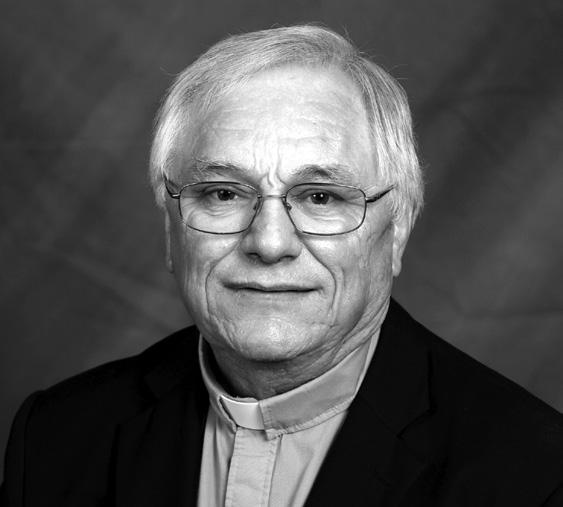
Deacon Kenneth Stalboerger SPICER – Deacon Kenneth Stalboerger, a member of the Diocese of New Ulm’s first ordination class of permanent deacons, died on March 13, 2022, at his home near New London, Minn. He was 75. A Mass of Christian Burial was held on March 21 at the Church of Our Lady of the Lakes in Spicer, with burial in the church cemetery.
Deacon Stalboerger entered the Diocese of New Ulm’s permanent deacon formation program in the fall of 2007 as an aspirant, and one year later was admitted to candidacy for Holy Orders by Bishop John M. LeVoir. He was ordained a permanent deacon on April 21, 2012, by Bishop LeVoir at the Church of St. Mary in Sleepy Eye. He was assigned to his home parish, the Church of Our Lady of the Lakes and assisted in the Jesus Our Living Water Area Faith Community (St. Clara, Clara City, St. Mary, Willmar, Our Lady of the Lakes, Spicer.) Deacon Stalboerger was born on July 6, 1946, in Mahnomen, Minn. He grew up on the family farm near Waubun and attended Waubun High School, graduating in 1964. He attended North Dakota State University where he received a bachelor’s degree in Animal Science and Economics.
On Aug. 23, 1969, he married Yvonne Trnka. They had two daughters, Kim and Kirsten. The couple made their home in Fargo and later divorced. On Dec. 16, 1977, he married Elta Solem. They had three children, Kelsy, Kate, and Kurt. The family resided in Thief River Falls before moving to New London in 2000.
Clergy receive new parish assignments
Effective July 1, 2022
Fr. Shawn Polman to serve as parochial vicar to the Church of the Holy Redeemer in Marshall as well as the other parishes in the Bread of Life AFC (St. Clotilde, Green Valley and St. Mary, Cottonwood) and the parishes of Our Lady of the Prairie AFC (St. Mary, Tracy and St. Michael, Milroy.)
Fr. Cornelius Ezeiloaku to serve as parochial vicar to the Church of St. Catherine in Redwood Falls as well as the other parishes in the Light of the World AFC (St. Anne, Wabasso and Our Lady of Victory, Lucan). In addition, he will serve as a fill-in for priests needing weekend and holy day assistance in our diocese.
Fr. Zach Peterson to serve as parochial vicar to the Church of St. Aloysius in Olivia as well as the other parishes in the Heart of Jesus AFC (St. Mary, Bird Island and Holy Redeemer, Renville.) In addition, he will assist with Hispanic ministry at the Church of St. Mary in Willmar as requested by the pastor.
diocesan church Ordinations 2022: Soon-to-be priests ready to serve the Church
by Abbigail Saffert Prairie Catholic correspondent Three Diocese of New Ulm seminarians will be ordained priests on Saturday, May 28, 2022, at 10:00 a.m. at the Church of St. Mary in Sleepy Eye. If a new bishop of the diocese has not been appointed at that time, Bishop Emeritus John M. LeVoir will return to the diocese to ordain the men.
Deacon Thooft
Thoughts about the priesthood came early for Deacon Tanner Thooft. It was in second grade, when he attended regular Saturday night Mass with his family, that he wondered what it was about the priest celebrating Mass that drew so many people there each week.
“I remember being really intrigued by that,” Thooft says. “There must be something special, something different here.”
Thooft questioned his parents about it afterward. Living and working on a farm with his family were the two most significant features of his life, so he asked where his parish priest’s family and farm were. When his parents told him that the parish and community were the priest’s spiritual children, Thooft initially thought that this path wasn’t for him. But yet, he wondered what would make someone give up a family to pursue the priesthood?
The question of what was so important about the priest’s role stuck with Thooft through Catholic school and into high school when he had the opportunity to go on a retreat. At the time, he wasn’t much interested in the retreat. “I didn’t want to get anything out of it - just get out of school.”
However, during a time of quiet prayer on the retreat, Thooft found himself walking the Stations of the Cross and feeling the sense that something in life wasn’t quite right. “I couldn’t put my finger on it,” he recalls. “I’ve got friends, good grades, teachers like me; I love my family. But there’s something that’s off.” In praying and speaking with God, Thooft realized that doing things his way wasn’t leading to happiness, and that proved to be the turning point that led him to seminary. In seminary, Thooft was influenced by the example of faithfulness and holiness from his father. He recalled his dad bringing the problems and decisions of everyday farm and family life to Mass each week and laying them at the foot of the altar.
“This is what you do as a priest,” Thooft says. “You have nothing of yourself to offer. You bring the parish to the Lord, lay them at the foot of the altar, and offer the sacrifice of the Mass for them.”
Thooft also drew on the lessons of the farm. “With the farm, you really have to learn to rely on God,” he says. “You do your best. . .work and do everything perfectly, but it’s still up to God whether things work out.”
This focus on God in everyday life is also one of the aspects of the priesthood Thooft is looking forward to most.
“One of the great joys will be to visit with farmers and families, to walk into their everyday life, into the joys, sorrows, great things, disasters. And I am bringing Christ into this situation, whatever is happening. Even something like fall harvest, to put in the bulletin that Father’s day off is Monday, and he would love to help in the fields. The Lord loves these things. He’s given you the vocation to be a farmer, so do it well, and you’re serving Christ - when you go to work, to the grocery store, whatever you’re doing.”
Deacon Hansen
Deacon Nathan Hansen started to consider the priesthood after watching his father become a permanent deacon for the diocese in 2012.
“As I was thinking about what I wanted to do and what my mission is, I started praying and asking God what His plan was, so I just kept my heart open,” Hansen says. “I kind of thought about the Old Testament stories, where God calls you, but no one had called me like that.”
While thinking and praying about the decision, Hansen enrolled in a community college in Hutchinson, Minn. On the drive to and from school, he listened to clergy speak on Relevant Radio and thought he could see himself as a priest. “There’s a lot of good a priest can do, and I found myself with a Deacon Tanner Thooft
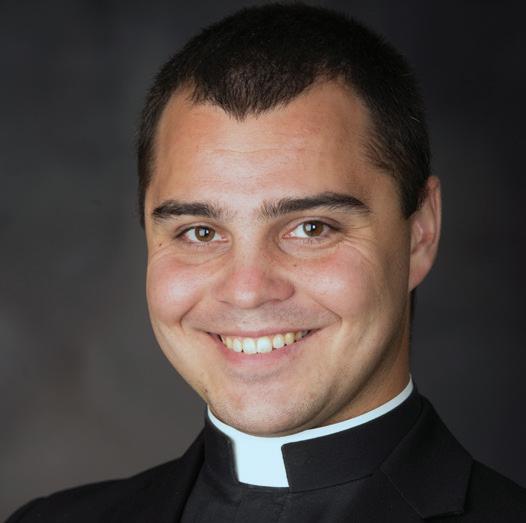
Scott & Debbie Thooft St. Edward, Minneota
desire to help people,” he recalls.
Hansen remembers falling asleep one night thinking that he had no desire to spend his life behind a desk. “There’s no peace; there’s no joy there. I told my parents and said I think I might be called to be a priest instead of spending the year trying to become an engineer.” With his parents’ support, they all went out to coffee to discuss this new path. Through this conversation, Hansen decided to take a year off to discern. “That was really life-giving for me to have that time to process and discern,” he says.
The discernment led Hansen to begin speaking with the vocations director for the diocese, but he remained unsure. He took a construction job, but “as much as I enjoy working with my hands, there was still no joy or peace.”
Hansen’s next step finally became apparent on a TEC retreat (Together Encounter Christ) where young adults explore and deepen their faith. “I encountered a guy who said ‘seminary is a place for young men to pursue the ways of God.’”
“That was clear,” Hansen said. “That’s where I want to be.” He called the vocations director and entered the seminary.
Hansen jokes that studying philosophy in seminary “wasn’t what got me out of bed in the morning.” At one point while studying in Rome, he recalls seeing another man who loved philosophy and thinking: “Lord, I’m not like him. Why should I keep going?” Hansen remembers walking by a little chapel and having the sense of the Lord saying, “Nathan, I call who I call.”
“It’s not I who chose Him, but He who chose me,” says Hansen. Through this and many other moments, God continued to lead Hansen through seminary. He remembers praying, “Well Lord, if you want me to go, you’ve got to make it happen.”
Hansen looks forward to seeing the Lord’s work as a priest in the people around him. As a kid, he remembers going with his parents to daily Mass and listening to the older generations telling stories over coffee and donuts afterward.
“What every priest needs to do is listen to his people. I think I learned that when I was young,” says Hansen, recalling the stories and lessons from those early times. He continues to look forward to “really encountering the people, being with them and seeing what God is doing with their lives.” He also hopes to be a good administrator and to be a faithful steward of the gifts his parish staff brings to the table, “to help take that from being a job to being a vocation and having an encounter with the Lord, learning to thrive with the Lord and doing his work.”
Deacon Bot
For Deacon Joshua Bot, discernment started with a game of chess. When his parish priest came to the family’s home for dinner, Bot, then a secondgrader, challenged him to a chess match. “I lost in two moves, which immediately earned my respect and admiration for him,” remembers Bot. “However, I started from that time to see priests as more approachable, which eventually led me asking myself whether I might be called to that.”
Bot pursued that question by visiting St. John Vianney College Seminary in St. Paul to consider whether to enter. “I got to know the seminarians, and I saw that fraternity they had. It was different from any other group of guys that I had been a part of up to that point. It was a group of guys who all wanted to grow in holiness and serve God’s Church, while supporting one another in doing so.”
Bot decided to enter the seminary, and in his third year, he spent time studying and praying in Rome. While there, a retreat experience became a turning point for him. “I was just praying to God asking him if this was something that I could really do, and be fulfilled in doing,” said Bot. Being a husband and father was also something Bot had a deep desire for, so he spent time praying for clarity. “As I prayed that prayer, I closed my eyes and saw myself as a husband and father in a perfect family, with an awesome job. However, even though everything was perfect, I didn’t feel fulfilled,” he recalls. When thinking of himself as a priest, though, even imagining a situation where everything was going badly, Bot still found a sense of peace and fulfillment. “It was as if God was saying, ‘Even if all you had left was me, I would still be enough for you.’ It was at that point that I really made my decision.”
Bot is looking forward to many aspects of being a priest. “I look forward to serving God and living my life giving myself to Him and his people by saying Mass, hearing confessions, and serving the people of God.”
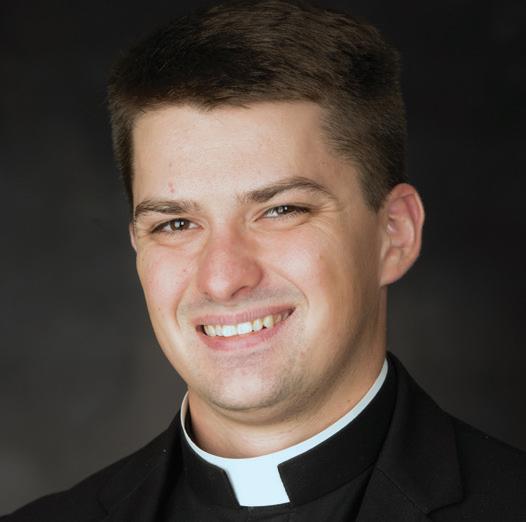
Deacon Nathan Hansen
Deacon John & Ruthann Hansen St. John, Darwin Deacon Joshua Bot
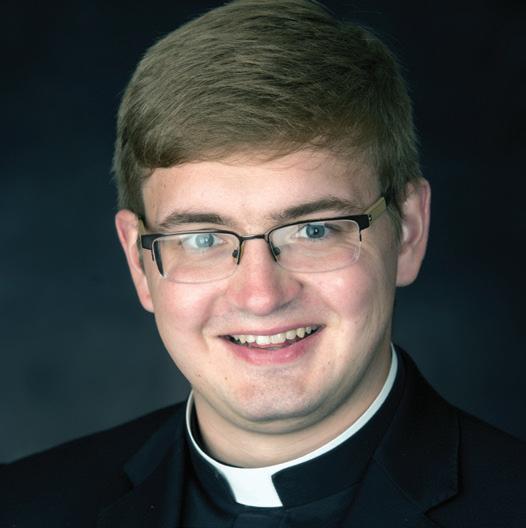
Deacon Bruce & Juanita Bot St. Edward, Minneota
The Diocese of New Ulm priest ordination on May 28 will be live-streamed at www.dnu.org. A recording of the Mass will remain on the website for on-demand viewing.
Laudato Si’ Action Platform seven years to sustainability
Pope Francis’ encyclical Laudato Si’, On Care for Our Common Home, was published May 24, 2015, and first released on June 18 of that year. Laudato Si’ means “Praise be to You,” which is the first line of a canticle by Saint Francis that praises God with all of his creation.
In his papal letter, the Holy Father unites social justice, economic inequity, and various issues related to ecology and the environment. The first encyclical of its kind, the pope’s words in Laudato Si’ have reached well beyond the Catholic Church and have been highly praised by people of all faiths. Deacon Tim Dolan, director of Social Concerns for the Diocese of New Ulm, recently agreed to a question and answer for The Prairie Catholic with environmental activist Judy Schindler of Bird Island about Laudato Si’ and the pope’s sevenyear Action Platform.
Q. In 2021, six years after its release, the Vatican officially launched a seven-year Laudato Si’ Action Platform (LSAP), a new global campaign to bring the message of this 2015 encyclical more fully into the lives of the faithful. What are the seven goals of LSAP?
A. Discerning a response to the ecological crisis is a profound act of care. In his encyclical, the Holy Father states this: “Caring for our brothers and sisters means caring for the home we share.” At this point, action is needed, and the seven goals found in Laudato Si can guide our actions and call for both a spiritual and cultural revolution to realize essential ecology. The seven goals of this vital Action Platform are: 1. Response to the cry of the earth; 2. Response to the cry of the poor; 3. Ecological economics; 4. Adoption of sustainable lifestyles; 5. Ecological lifestyles; 6. Ecological spirituality; and 7. Community resilience and empowerment.
Q. The pope’s encyclical is addressed to all people of goodwill. The LSAP is addressed to seven sectors (families, parishes, schools, hospitals, businesses, organizations, and religious orders) over seven years. Any significance to the number seven?
A. In sacred Scripture, the number seven signifies fullness or completeness. Think of the seven days of creation or the seven sacraments. The LSAP suggests the first year should be for planning, assessing where we are now, and what we want to do to make progress towards the goals. The next five years are for putting into action the changes needed to move towards those goals. The seventh-year is to be a time of celebrating!
Q. Who can use the LSAP, and how does one join the Platform?
A. Parishes, schools, families, organizations, and individuals are encouraged to learn all they can about the LSAP. They can do this by going to www.laudatosi. org, where they will find much information, including a short video of Pope Francis inviting everyone to begin a seven-year journey to total sustainability. They will learn about what is already happening worldwide in response to the pope’s encyclical and practical ideas for moving towards greater sustainability.
Q. What do you suppose inspired Pope Francis to write Laudato Si’? To whom is it addressed?
A. Interestingly, as a young man, the Holy Father trained to be a chemist and worked as a technician in a food science laboratory. To understand how he was led to write Laudato Si, we need only to look back to previous popes. Pope Francis included some of their documents, writings, and quotes that focused on environmental concerns in his encyclical. For example, in 1971, Saint Pope Paul VI referred to the ecological concern as “a tragic consequence” of unchecked human activity: “Due to an ill-considered exploitation of nature, humanity runs the risk of destroying it and becoming, in turn, a victim of this degradation.” Saint John Paul II became increasingly concerned about the environmental issue. He warned that human beings frequently seem “to see no other meaning in their natural environment than what serves for immediate use and consumption.” Subsequently, he would call for global ecological conversion.

The Laudato Si’ Goals
1. Response to the Cry of the Earth - Adoption of renewable energies and energy sufficiency measures, carbon neutrality, protecting biodiversity, sustainable agriculture, and access to clean water for all. 2. Response to the Cry of the Poor - Defense of human life from conception to natural death and all forms of life on earth, with special attention to vulnerable groups such as indigenous communities, migrants, and children at risk through slavery. 3. Ecological Economics - Sustainable production, fair-trade, ethical consumption, ethical investments, divestment from fossil fuels and any economic activity harmful to the planet and the people, and investment in renewable energy. 4. Adoption of Simple Lifestyles - Sobriety in the use of resources and energy, avoid single-use plastic, adopt a more plant-based diet and reduce meat consumption, greater use of public transport, and avoid polluting modes of transportation. 5. Ecological Education - Re-think and re-design educational curricula and educational institution reform in the spirit of integral ecology to create ecological awareness and action, promoting the ecological vocation of young people, teachers, and leaders of education. 6. Ecological Spirituality- Recover a religious vision of God’s creation, encourage greater contact with the natural world in a spirit of wonder, praise, joy and gratitude, promote creation-centred liturgical celebrations, develop ecological catechesis, prayer, retreats, and formation. 7. Emphasis on Community involvement - and participatory action to care for creation at the local, regional, national and international levels (promote advocacy and people’s campaigns, encourage rootedness in local territory and neighbourhood ecosystems.

Benedict XVI likewise proposed “Eliminating the structural causes of the dysfunctions of the world economy and correcting models of growth which have proved incapable of ensuring respect for the environment.” He asked us to “recognize that the natural environment has been gravely damaged by our irresponsible behavior and we need to recognize any higher instance than ourselves, when we see nothing else but ourselves.”
Q. The whole climate issue is pretty overwhelming. Do you feel there is a connection between climate change and the issue of right-to-life? And what are some steps ordinary people can start doing right now to help slow the climate change process?
A. As a Catholic, the issue of right-to-life holds a high standard. I agree with the United Nations Environment Programme (UNEP) website, www.unep.org, when it states: “Human rights and the environment are intertwined; human rights cannot be enjoyed without a safe, clean, and healthy environment; and sustainable environmental governance cannot exist without the establishment of and respect for human rights.” One way to make a positive change is to reduce the amount of single-use plastics such as grocery bags, straws, and takeout containers that we use. A typical family uses hundreds of plastics every year, much of which ends up in our landfills. The Laudato Si’ Action Platform is an excellent start to help encourage communities throughout our diocese and beyond to begin individual efforts like this. I am hopeful that the Action Platform will inspire significant change and spark new ideas suitable to our planet earth. As Pope Francis wrote, “All of us can cooperate as instruments of God for the care of creation, each according to his or her own culture, experience, involvements, and talents” (LS 14).
United Nations report paints a dire picture of our future.
According to a United Nations report on April 4, 2022, we learned that if we do not reduce pollutant-bearing emissions and other contaminants across all sectors, limiting global warming to 1.5°C is beyond reach. Though this report tends to paint a dire picture of the future, it also indicates that there is still time to mitigate the most severe consequences of climate change. Positive changes made now can allow for a livable future, and it is important that each one of us take the time to learn what we can do as a society that will stimulate us to do what must be done to clean up “our common home.” Editor’s note: Judy Schindler is a member St. Mary’s in Bird Island. During the 1980s and 1990s, she served on various diocesan committees, including the Ecumenical Committee, the Adult Education Advisory Committee, and the Evangelization and Catechesis Committee. She also served as the New Ulm Diocesan Council of Catholic Women (NUDCCW) International Affairs Commission chairperson and as NUDCCW vice-president.
Laudato Si’ Week May 22-29, 2022!
Learn more about this special week at www.laudatosiweek. org. This year’s theme is Integral Ecology: Pursuing the Common Good for our Common Home. For resources, ideas, and inspiration, visit The Catholic Climate Covenant website, www. catholicclimatecovenant.org/. For more information about the LSAP, contact the diocesan Office of Social Concerns, tdolan@dnu.org; (509) 2335326.




